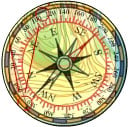The End of Geography
Created | Updated Mar 8, 2007

As we reach the latter half of the first decade of the millennium, it seems an appropriate time to consider the lessons that the decade holds. The first, and possibly most important, is the end of geography.
My brother-in-law loves maps. And flags. During the course of the World Cup last year, there was a pub near him that hung several flags outside. He went in and told them which flags were upside-down. One of them was Germany's flag, and it quite amused him that that one was the wrong way up. But I digress.
Land and flags are the things that define countries as separate and distinct entities. Things that make them unique, as no two countries share the same piece of land and no two countries share the same flag. My brother-in-law is, admittedly, very patriotic. Almost to the extent of being nationalistic, which makes him something of an oddity in these times.
He also occasionally looks at a map of Europe and states, with absolute certainty, that Turkey does not appear on it. So, he asks, why can they be allowed to join the European Union, since they clearly aren't in Europe? The answer, which he doesn't like, and can't understand, is that geography doesn't matter anymore. Turkey is eligible for EU membership because it is politically useful to have them join. Geography has nothing to do with it, it's all politics.
It seems that one of the prevailing factors of this decade it this divorce from geography. Companies who were once tied to the countries in which they originated can now out-source and have a workforce in a completely different country for account processing and call-centre work. Though by the sound of things, a lot of that is being reversed due to customer dissatisfaction.
Unless you're looking my hard drive, you are reading this text on the Internet. Surely this is the greatest monument to dislocation that we have yet formed. Why? Well, you don't know where I live, and I don't know where you live. But here we both are, able to share information and converse across 'cyberspace'. A place with no land, no flag, no nationality, but seeming millions who claim to be citizens. Geography has no relevance here. It doesn't matter.
The question is, is this a good thing or not? Do we lose something when we transcend geography? Or do we lose nothing, but rather gain the world? I haven't got the answer to that yet. Do you think I could Google for it?
